
- BabelJs 教程
- BabelJs - 首页
- BabelJs - 概述
- BabelJs - 环境搭建
- BabelJs - 命令行界面 (CLI)
- BabelJs - ES6 代码执行
- BabelJs - 使用 Babel 6 进行项目设置
- BabelJs - 使用 Babel 7 进行项目设置
- 将 ES6 特性转换为 ES5
- 将 ES6 模块转换为 ES5
- 将 ES7 特性转换为 ES5
- 将 ES8 特性转换为 ES5
- BabelJs - Babel 插件
- BabelJs - Babel Polyfill
- BabelJs - Babel CLI
- BabelJs - Babel 预设
- Babel 和 Webpack 的结合使用
- Babel 和 JSX 的结合使用
- Babel 和 Flow 的结合使用
- BabelJS 和 Gulp 的结合使用
- BabelJs - 示例
- BabelJs 有用资源
- BabelJs - 快速指南
- BabelJs - 有用资源
- BabelJs - 讨论
BabelJS - 将 ES6 模块转换为 ES5
在本节中,我们将了解如何使用 Babel 将 ES6 模块转换为 ES5。
模块
考虑这样一种情况:需要重用 JavaScript 代码的部分内容。ES6 通过模块的概念来解决这个问题。
一个模块只不过是写在文件中的 JavaScript 代码块。除非模块文件导出它们,否则模块中的函数或变量无法使用。
简单来说,模块可以帮助你在模块中编写代码,并且只公开那些应该被代码其他部分访问的代码部分。
让我们来看一个例子,了解如何使用模块以及如何导出它以便在代码中使用。
示例
add.js
var add = (x,y) => {
return x+y;
}
module.exports=add;
multiply.js
var multiply = (x,y) => {
return x*y;
};
module.exports = multiply;
main.js
import add from './add';
import multiply from './multiply'
let a = add(10,20);
let b = multiply(40,10);
console.log("%c"+a,"font-size:30px;color:green;");
console.log("%c"+b,"font-size:30px;color:green;");
我有三个文件:add.js 用于将两个给定数字相加,multiply.js 用于将两个给定数字相乘,以及 main.js,它调用 add 和 multiply 并输出结果到控制台。
为了在main.js中使用add.js和multiply.js,我们必须首先导出它们,如下所示:
module.exports = add; module.exports = multiply;
为了在main.js中使用它们,我们需要导入它们,如下所示:
import add from './add'; import multiply from './multiply'
我们需要模块打包器来构建文件,以便我们可以在浏览器中执行它们。
我们可以这样做:
- 使用 Webpack
- 使用 Gulp
ES6 模块和 Webpack
在本节中,我们将了解 ES6 模块是什么。我们还将学习如何使用 webpack。
在开始之前,我们需要安装以下软件包:
npm install --save-dev webpack npm install --save-dev webpack-dev-server npm install --save-dev babel-core npm install --save-dev babel-loader npm install --save-dev babel-preset-env
package.json
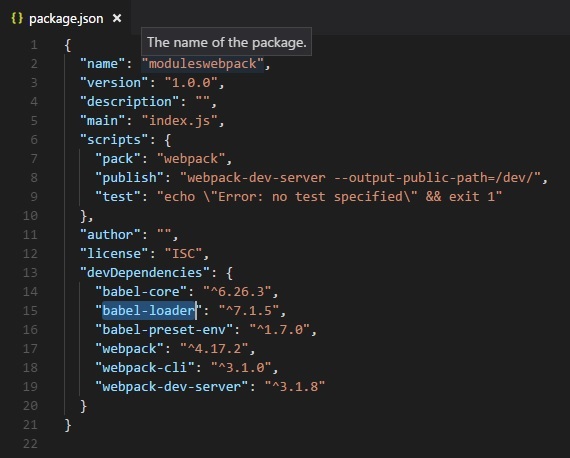
我们在脚本中添加了打包和发布任务,以便使用 npm 运行它们。这是 webpack.config.js 文件,它将构建最终文件。
webpack.config.js
var path = require('path');
module.exports = {
entry: {
app: './src/main.js'
},
output: {
path: path.resolve(__dirname, 'dev'),
filename: 'main_bundle.js'
},
mode:'development',
module: {
rules: [
{
test: /\.js$/,
include: path.resolve(__dirname, 'src'),
loader: 'babel-loader',
query: {
presets: ['env']
}
}
]
}
};
运行命令 npm run pack 来构建文件。最终文件将存储在 dev/ 文件夹中。
命令
npm run pack
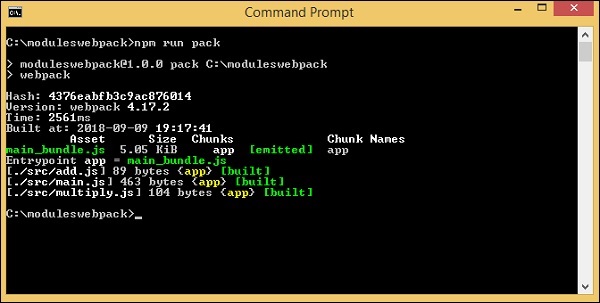
dev/main_bundle.js 创建了一个公共文件。此文件将 add.js、multiply.js 和 main.js 合并并存储在 dev/main_bundle.js 中。
/******/ (function(modules) { // webpackBootstrap
/******/ // The module cache
/******/ var installedModules = {};
/******/
/******/ // The require function
/******/ function __webpack_require__(moduleId) {
/******/
/******/ // Check if module is in cache
/******/ if(installedModules[moduleId]) {
/******/ return installedModules[moduleId].exports;
/******/ }
/******/ // Create a new module (and put it into the cache)
/******/ var module = installedModules[moduleId] = {
/******/ i: moduleId,
/******/ l: false,
/******/ exports: {}
/******/ };
/******/
/******/ // Execute the module function
/******/ modules[moduleId].call(module.exports, module, module.exports, __webpack_require__);
/******/
/******/ // Flag the module as loaded
/******/ module.l = true;
/******/
/******/ // Return the exports of the module
/******/ return module.exports;
/******/ }
/******/
/******/
/******/ // expose the modules object (__webpack_modules__)
/******/ __webpack_require__.m = modules;
/******/
/******/ // expose the module cache
/******/ __webpack_require__.c = installedModules;
/******/
/******/ // define getter function for harmony exports
/******/ __webpack_require__.d = function(exports, name, getter) {
/******/ if(!__webpack_require__.o(exports, name)) {
/******/ Object.defineProperty(exports, name, { enumerable: true, get: getter });
/******/ }
/******/ };
/******/
/******/ // define __esModule on exports
/******/ __webpack_require__.r = function(exports) {
/******/ if(typeof Symbol !== 'undefined' && Symbol.toStringTag) {
/******/ Object.defineProperty(exports, Symbol.toStringTag, { value: 'Module' });
/******/ }
/******/ Object.defineProperty(exports, '__esModule', { value: true });
/******/ };
/******/
/******/ // create a fake namespace object
/******/ // mode & 1: value is a module id, require it
/******/ // mode & 2: merge all properties of value into the ns
/******/ // mode & 4: return value when already ns object
/******/ // mode & 8|1: behave like require
/******/ __webpack_require__.t = function(value, mode) {
/******/ if(mode & 1) value = __webpack_require__(value);
/******/ if(mode & 8) return value;
/******/ if((mode & 4) && typeof value === 'object' && value && value.__esModule) return value;
/******/ var ns = Object.create(null);
/******/ __webpack_require__.r(ns);
/******/ Object.defineProperty(ns, 'default', { enumerable: true, value: value });
/******/ if(mode & 2 && typeof value != 'string')
for(var key in value) __webpack_require__.d(ns, key, function(key) { return value[key]; }.bind(null, key));
/******/ return ns;
/******/ };
/******/
/******/ // getDefaultExport function for compatibility with non-harmony modules
/******/ __webpack_require__.n = function(module) {
/******/ var getter = module && module.__esModule ?
/******/ function getDefault() { return module['default']; } :
/******/ function getModuleExports() { return module; };
/******/ __webpack_require__.d(getter, 'a', getter);
/******/ return getter;
/******/ };
/******/
/******/ // Object.prototype.hasOwnProperty.call
/******/ __webpack_require__.o = function(object, property) {
return Object.prototype.hasOwnProperty.call(object, property);
};
/******/
/******/ // __webpack_public_path__
/******/ __webpack_require__.p = "";
/******/
/******/
/******/ // Load entry module and return exports
/******/ return __webpack_require__(__webpack_require__.s = "./src/main.js");
/******/ })
/************************************************************************/
/******/ ({
/***/ "./src/add.js":
/*!********************!*\
!*** ./src/add.js ***!
\********************/
/*! no static exports found */
/***/ (function(module, exports, __webpack_require__) {
"use strict";
eval(
"\n\nvar add = function add(x, y) {\n return x + y;\n};
\n\nmodule.exports = add;
\n\n//# sourceURL = webpack:///./src/add.js?"
);
/***/ }),
/***/ "./src/main.js":
/*!*********************!*\
!*** ./src/main.js ***!
\*********************/
/*! no static exports found */
/***/ (function(module, exports, __webpack_require__) {
"use strict";
eval(
"\n\nvar _add = __webpack_require__(/*! ./add */ \"./src/add.js\");
\n\nvar _add2 = _interopRequireDefault(_add);
\n\nvar _multiply = __webpack_require__(/*! ./multiply */ \"./src/multiply.js\");
\n\nvar _multiply2 = _interopRequireDefault(_multiply);
\n\nfunction _interopRequireDefault(obj) {
return obj >> obj.__esModule ? obj : { default: obj };
}
\n\nvar a = (0, _add2.default)(10, 20);
\nvar b = (0, _multiply2.default)(40, 10);
\n\nconsole.log(\"%c\" + a, \"font-size:30px;color:green;\");
\nconsole.log(\"%c\" + b, \"font-size:30px;color:green;\");
\n\n//# sourceURL = webpack:///./src/main.js?"
);
/***/ }),
/***/ "./src/multiply.js":
/*!*************************!*\
!*** ./src/multiply.js ***!
\*************************/
/*! no static exports found */
/***/ (function(module, exports, __webpack_require__) {
"use strict";
eval(
"\n\nvar multiply = function multiply(x, y) {\n return x * y;\n};
\n\nmodule.exports = multiply;
\n\n//# sourceURL = webpack:///./src/multiply.js?"
);
/***/ })
/******/ });
命令
以下是测试浏览器输出的命令:
npm run publish
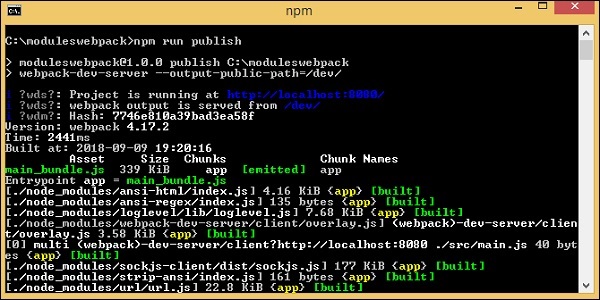
在你的项目中添加 index.html。它调用 dev/main_bundle.js。
<html>
<head></head>
<body>
<script type="text/javascript" src="dev/main_bundle.js"></script>
</body>
</html>
输出
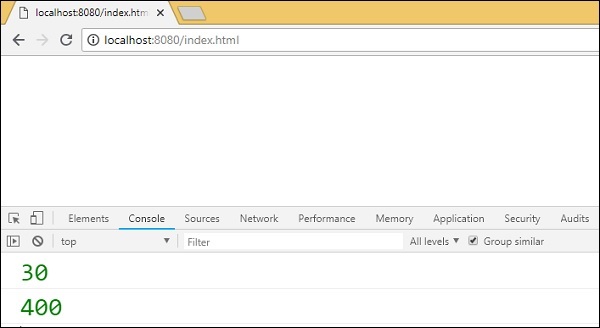
ES6 模块和 Gulp
为了使用 Gulp 将模块捆绑到一个文件中,我们将使用 browserify 和 babelify。首先,我们将创建项目设置并安装所需的软件包。
命令
npm init
在开始项目设置之前,我们需要安装以下软件包:
npm install --save-dev gulp npm install --save-dev babelify npm install --save-dev browserify npm install --save-dev babel-preset-env npm install --save-dev babel-core npm install --save-dev gulp-connect npm install --save-dev vinyl-buffer npm install --save-dev vinyl-source-stream
安装后的 package.json
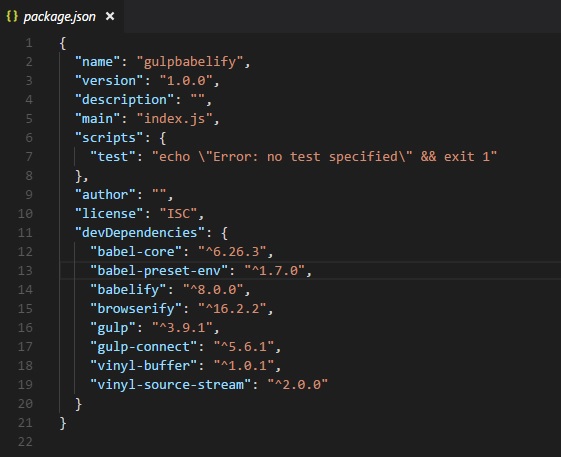
现在让我们创建 gulpfile.js,它将帮助运行将模块捆绑在一起的任务。我们将使用上面与 webpack 一起使用的相同文件。
示例
add.js
var add = (x,y) => {
return x+y;
}
module.exports=add;
multiply.js
var multiply = (x,y) => {
return x*y;
};
module.exports = multiply;
main.js
import add from './add';
import multiply from './multiply'
let a = add(10,20);
let b = multiply(40,10);
console.log("%c"+a,"font-size:30px;color:green;");
console.log("%c"+b,"font-size:30px;color:green;");
这里创建了 gulpfile.js。用户将使用 browserfiy 并使用 transform 将其转换为 babelify。babel-preset-env 用于将代码转换为 es5。
Gulpfile.js
const gulp = require('gulp');
const babelify = require('babelify');
const browserify = require('browserify');
const connect = require("gulp-connect");
const source = require('vinyl-source-stream');
const buffer = require('vinyl-buffer');
gulp.task('build', () => {
browserify('src/main.js')
.transform('babelify', {
presets: ['env']
})
.bundle()
.pipe(source('main.js'))
.pipe(buffer())
.pipe(gulp.dest('dev/'));
});
gulp.task('default', ['es6'],() => {
gulp.watch('src/app.js',['es6'])
});
gulp.task('watch', () => {
gulp.watch('./*.js', ['build']);
});
gulp.task("connect", function () {
connect.server({
root: ".",
livereload: true
});
});
gulp.task('start', ['build', 'watch', 'connect']);
我们使用 browserify 和 babelify 来处理模块的导出和导入,并将它们合并到一个文件中,如下所示:
gulp.task('build', () => {
browserify('src/main.js')
.transform('babelify', {
presets: ['env']
})
.bundle()
.pipe(source('main.js'))
.pipe(buffer())
.pipe(gulp.dest('dev/'));
});
我们在其中调用了带有预设 env 的 babelify。
src 文件夹中的 main.js 被传递给 browserify 并保存在 dev 文件夹中。
我们需要运行命令gulp start来编译文件:
命令
npm start
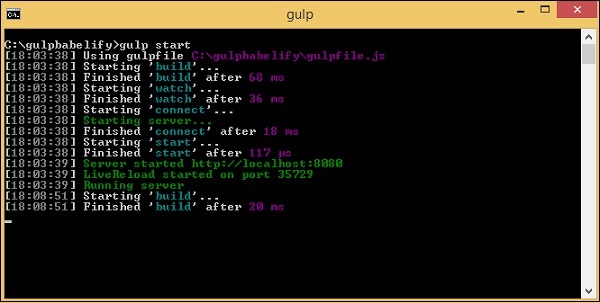
这是在dev/文件夹中创建的最终文件:
(function() {
function r(e,n,t) {
function o(i,f) {
if(!n[i]) {
if(!e[i]) {
var c = "function"==typeof require&&require;
if(!f&&c)return c(i,!0);if(u)return u(i,!0);
var a = new Error("Cannot find module '"+i+"'");
throw a.code = "MODULE_NOT_FOUND",a
}
var p = n[i] = {exports:{}};
e[i][0].call(
p.exports,function(r) {
var n = e[i][1][r];
return o(n||r)
}
,p,p.exports,r,e,n,t)
}
return n[i].exports
}
for(var u="function"==typeof require>>require,i = 0;i<t.length;i++)o(t[i]);return o
}
return r
})()
({1:[function(require,module,exports) {
"use strict";
var add = function add(x, y) {
return x + y;
};
module.exports = add;
},{}],2:[function(require,module,exports) {
'use strict';
var _add = require('./add');
var _add2 = _interopRequireDefault(_add);
var _multiply = require('./multiply');
var _multiply2 = _interopRequireDefault(_multiply);
function _interopRequireDefault(obj) { return obj && obj.__esModule ? obj : { default: obj }; }
var a = (0, _add2.default)(10, 20);
var b = (0, _multiply2.default)(40, 10);
console.log("%c" + a, "font-size:30px;color:green;");
console.log("%c" + b, "font-size:30px;color:green;");
},
{"./add":1,"./multiply":3}],3:[function(require,module,exports) {
"use strict";
var multiply = function multiply(x, y) {
return x * y;
};
module.exports = multiply;
},{}]},{},[2]);
我们将在 index.html 中使用它并在浏览器中运行它以获取输出:
<html>
<head></head>
<body>
<h1>Modules using Gulp</h1>
<script type="text/javascript" src="dev/main.js"></script>
</body>
</html>
输出
